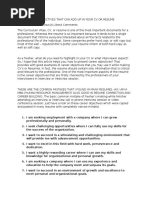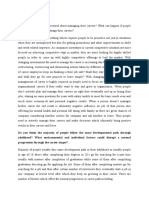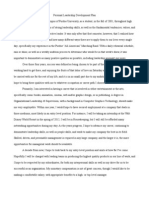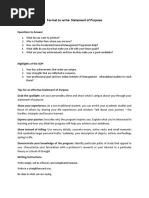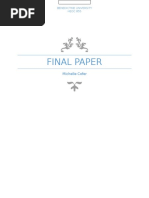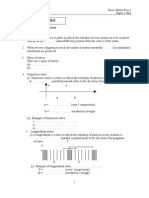Running Head: CAREER PLANNING 1
Running Head: CAREER PLANNING 1
Uploaded by
api-310748370Copyright:
Available Formats
Running Head: CAREER PLANNING 1
Running Head: CAREER PLANNING 1
Uploaded by
api-310748370Original Title
Copyright
Available Formats
Share this document
Did you find this document useful?
Is this content inappropriate?
Copyright:
Available Formats
Running Head: CAREER PLANNING 1
Running Head: CAREER PLANNING 1
Uploaded by
api-310748370Copyright:
Available Formats
Running Head: CAREER PLANNING
Career Planning
Kelly Chambers
Siena Heights University
LDR 610
Career Development & Mentoring
Professor Loughran
August 19, 2016
CAREER PLANNING
2
Table of Contents
Introduction
Communication
Analysis
Synthesis
Valuing
Execution
11
Communication Recycled
Conclusion
13
References
14
12
CAREER PLANNING
3
Career Planning
Each and every day individuals are making decisions on matters that can range from
simple daily events such as lunch choices to more complex major life decisions such as home
ownership or long term relationships. It is undeniable that as we proceed through life we will
make our fair share of poor decisions but how we go about minimizing these sometimes
regrettable decisions is key. Since many of these decisions can impact our quality of life it is
crucial to understand the best method or tactics to use in order to make good decisions especially
when it comes to career planning.
One such method is called the CASVE cycle which was developed to help guide
individuals specifically through solving career problems and making significant career decisions
by utilizing five decision-making phases; communication, analysis, synthesis, valuing, and
execution (Reardon, Lenz, Peterson, & Sampson, 2012, p. 49). These underlying phases of the
CASVE cycle can assist individuals with their career dilemmas, for instance, by first identifying
the delta between their current career state and their ideal career state and then determining how
to narrow this gap by advancing forward with sound career decisions so they may ultimately
obtain their goal. In addition Sampson, Reardon, Peterson, and Lenz (2004, p. 110-111) explain,
following this model successfully by completing each stage will affect our approach to decisionmaking in general. Going through this process will help those involved become more solid and
informed decision makers in all situations.
Communication
The career problem solving and decision making process (CASVE cycle) begins with a
step that is critical to solving any situation; as Reardon et al. (2012, p. 248) states, the process
CAREER PLANNING
begins with identification of the current state of being, looking at what problems this state has
created and then discovering the ideal state or goal for the future. This includes the identification
of both internal and external factors that have gotten someone to the current place as well as
what factors are potential hindrances or aids in reaching the ideal state (Reardon et al., 2012, p.
248). The awareness of this gap motivates one to seek a solution to the career problem.
I myself have never really had or placed effort into a formalized career plan, I have been
able to go with the flow and luckily it has worked out to date. However, as my family needs and
my personal job satisfaction and drivers change, it will be important for me to determine if there
is still ability for me to move forward within my organization. I would also need to understand if
the available options would align with my personal career motivators. It is also critical that, if
once I have looked at my current and potential future state within my organization that if the
possibilities are undesirable, I determine a plan for what type of opportunities might be available
outside of my organization. It is critical that in this state I also begin to question what I need to
do now to start to position myself for roles I may wish to move into while still meeting my
current job expectations with my current employer. I must find answers to questions such as will
achieving my Masters degree be enough? Or does my current work experience show the skills I
need to more forward? What would I and my family gain or lose if I were to leave my current
organization?
I came into this course not really understanding what career development and mentoring
would truly cover and I was a little unsure of what realistic goals to set for myself. As a result I
selected career development as a whole; basically gaining a better understanding of what it was
and how this process could help me with achieving a career path. Part of determining a career
path was deciding if a role in management was ultimately a good career decision on my part;
CAREER PLANNING
time and time again at my organization I have seen where they move an employee who has
excelled in their current position into a management role and it has become a complete failure
because that employee wasnt given the tools or support needed in order to succeed. I dont want
to become another number in this trend. Therefore, I want to learn what the best techniques or
methods for delivering bad news are as well as figure out how to be less in control over services
that I used to be primary support on; basically have trust in my employees to delegate more tasks
to them. Again, I believe both of these tie back to whether a management role is ultimately the
best fit for me or if I would be better off continuing to advance myself as a technical powerhouse
of an employee.
At this point in my life I feel I can no longer live not having a solid game plan to either
continue on a managerial path or change focus. I would feel more secure emotionally and
mentally if I have a plan for my career future that not only meets my work needs but also
provides a stable lifestyle for my family. Knowing that I was working toward achievable
milestones such as completing my masters degree, getting 5 years of management experience
under my belt, excelling at my job and overcoming huddles, gaining enough knowledge in my
new role to tackle any problem, and becoming as comfortable as a manager as I was as a
technician, would give me a type of satisfaction I have not known in my go with the flow
lifestyle. This more than anything has been what has driven me to continue my education and
begin the career planning process. I think that having a plan would feel better than not having
one now that there are others, like my daughter, depending on my career success.
My current job description has Masters degree preferred and is the education level
required for almost all management positions within my current organization. Looking outside
my organization at other management positions a bachelors degree is typically a minimal
CAREER PLANNING
requirement with some type of product or system certification such as ITIL (Information
Technology Infrastructure Library) certification or PMP (Project Management Professional)
certification plus at least 5 years of experience (IT Manager, n.d., para. 2). This leads me to
believe that not only do I need to complete my masters degree, I should plan to continue my
education towards an IT certification that would be beneficial to my credibility if I choose to
grow within my organization but also make me more marketable if I choose to leave.
Additionally, I feel that the dedication that I am applying toward my education despite not being
a naturally academic person will demonstrate to my daughter that higher education is a worthy
pursuit and that one should never give up on achieving success, even when things dont come to
you easily. I am hoping that the return on investment of this degree will allow for a better quality
of life for not only myself but my family given that the average salary for an Information
Technology Manager is around $110,000 (Manager Salary, 2016, para. 1).
Analysis
Throughout this course I have begun to more fully understand my personal need for a
career plan. This was in large part due to a vast increase in knowledge about myself and what has
prevented me from planning plus what is now driving me toward more career satisfaction.
Though many of the assignments, discussions, and structured assessments, it began to become
clearer what has contributed to my current state and what my expectations are for myself moving
forward.
To date I have been able to get along on my natural skills, being creative, critical
thinking, technical by nature and being good with research. I am very much like my father who
can solve complex problems using creative solutions and our natural ability to see a path towards
success. I combined this with my interest in technology and education to get to the place I am
CAREER PLANNING
today. Given that I saw my father as a successful man that moved up within his organization
without a formal education, I felt that I too could take this sort of path. Additionally I have
through self-analysis realized that part of my resistance to higher education in the past has had to
do with two main factors, my avoidance of things that do not come to me naturally and watching
my mother lose her career after putting in vast amounts of time and money into her education.
However, having my daughter and beginning to look toward her future has changed many
of my work values and as a result required that I begin to overcome my resistance to education
and career planning. I realized that I had been successful by my own early adulthood definition
of success, decent pay and health benefits, however one thing that I didnt always see was the
vast time commitment I was giving my organization for what was below industry standards in
pay. Once my child arrived I was able to see what I really valued and needed beyond just my
basic personal interests and nave definition of success.
Today I want a position that not only allows me to play off my natural skills and abilities,
but also one that challenges me to grow skills that I need both professionally and as a parent. I
want a working world that adds value to me as a person. I want flexibility for my family, variety
and to take pride in what I am offering the world each day. Additionally I want to make a
standard of living for my family that allows us to do what we love, travel and see the world. To
meet this level of success required that I continue my education and training and begin to pursue
a career in management that would push me beyond my personal comfort level.
Additionally through past analysis I feel that planning to continue and advance my career
in technology within education is a good fit based on my self-assessment. I am an ENTP based
on the Myers-Briggs Type Indicator (Reardon et al, 2012, p.23) or extraversion, intuition,
thinking, perceiving. I am inventive, enthusiastic, strategic, enterprising, inquisitive, and
CAREER PLANNING
versatile. I enjoy new ideas, challenges, and value inspiration. Working within education is well
suited for my personality. I want to work for an organization that is willing to grow and change
to the needs of their clients; not force clients to have to change in order to meet the
organizations structure. Within the education realm organizations are constantly changing to
meet the needs of their primary customers; this way the students can be better prepared for the
career world that is in their future.
Synthesis
Having researched and discussed my career plan with other technical managers, friends,
family, and mentors, I feel my plan will be to continue to my current mid-level managerial
position, take on a higher managerial position, or pursue a teaching position within my current
organization. I love working in education and sharing knowledge with others, even when it is
challenging to my natural skill set. I knew early on that I wanted to help others learn about
technology and what better place to do that than in higher education where the primary focus is
educating others often through the use of technology.
Additionally, our family wishes to remain in our current school district and area to allow
our daughters grandparents to be heavily involved in her daily life. My wife lacked this
relationship growing up a great distance from her extended family and does not want this to
happen to our daughter. This also drives me to want to remain within my organization within one
of my career alternatives that I have listed. I have many friends and even former co-workers that
have moved on to other available technical managerial positons within similar higher education
and corporate settings in our area and based on their input, I do not feel I would have the same
level of job satisfaction anywhere else locally.
CAREER PLANNING
From researching at different working worlds in technology both online and from input
from friends, to me it is clear that education is most appealing. We are always able to have
cutting edge technology because we are teaching the future, and are usually more advanced than
most corporate technology departments. I like that I get to teach faculty technology and share
what I know with others and in turn they become more successful in the classroom. I would also
enjoy teaching students directly if that ever became an opportunity. I feel that I help to remove
the barrier technology can pose for many and open them up to it as a tool to teach with, learn
from and create solutions for the future. I also greatly enjoy the work life; putting out daily fires,
not having a set schedule, and never really knowing what you will be facing throughout the
course of a day. I get to engage with my team to solve complex problems and assist clients in
determining more efficient or streamlined methods of performing their work. Corporate
technology tends to be rather stagnant once they find solutions that work and maximize profit,
moving to this world would not offer the ever changing and challenging work that I have grown
to love.
Valuing
There are three key factors that are driving my career making process; my family, my
happiness, and my contribution to my community. I am strongly rooted to my family. Therefore
their happiness is critical to any choice that I make and what they value most from me is my
time. Having a position that is close to home and allows me to maximize my time with them
would be a good decision by my definition. I also need to feel that the work I am doing makes
me excited and challenges me to grow; I never want to stop growing professionally. I always
want to be learning something new as that is what really makes me happy to go to work. I also
feel that all my career options would have a positive impact on improving my community by
CAREER PLANNING
10
offering others the skills and credentials they need to fulfill their career goals. For many making
a career choice has to do only with financial gain and they lose sight of the other things they
value, I do not want to ever be in that position. At the end of each day, if I am in a position that
will provide my family a lifestyle we desire while still providing me career and personal life
balance and satisfaction I will feel I have made a sound choice.
There are benefits and costs associated with all three of my possible career plan
alternatives that would impact myself and my family. If I chose to simply stay within my current
position, we would likely see little increase in our financial situation, which would limit our
ability to travel and options for our daughters future education. The benefit to this choice would
be that I could focus all efforts on my current role. I would not have to spend time or
continuously evaluate if I am making decisions that increase my changes of promotion. This
however also then runs the risk that if at a future time I lose satisfaction in the position, feel I
have outgrown it, or it is eliminated I may not have what is needed to be marketable for my
career alternatives.
If I chose to move into higher management within my organization, the obvious benefit
would be financial gain for my family. Additionally, I would have the ability to push myself and
learn new skills and abilities plus be in a position that has direct influence on the direction of
technology within the organization. I would also have focused the time and energy on
certifications that would make me more marketable in the event I needed to move outside my
organization. Potential negatives to this career alternative would be decrease in work time
flexibility which would impact my time with family as well as the increased stress that would
accompany this positon level.
CAREER PLANNING
11
Pursuing a teaching position would offer many of the same benefits as the higher
management alternative such as financial and organizational influence. It would also add the
ability to directly impact the lives of our students and obtaining pride from watching others learn
and succeed. Downsides to this choice for someone like me would be that I would no longer be
in a position in which I directly solve problems; the loss of this satisfaction may not be
outweighed by the value of helping our students.
Based on these benefits and potential costs, I feel that my first choice in career
alternatives would be to pursue higher management within my organization since it has so many
potential positive outcomes for both myself and my family. My second choice would likely be to
look towards teaching and my final option would be to simply stay within my current role.
Execution
In order to execute the plan to become higher management within the next 5 years at my
current organization I would need to take the following steps;
1. I would express my interest to my immediate supervisor within the coming year to see if
he feels this is a realistic option and gain his insight as to what I may need to focus efforts
on in order to meet this goal. I would also seek his input on the pros and cons of higher
management given he already has firsthand experience.
2. I would continue my focus and complete my degree by December 2017, since a Masters
degree is a minimum requirement for all higher managerial positions within the
organization.
3. I would also focus on obtaining some industry recognized certifications by late 2018 in
order to increase my marketability and credibility as a higher level technology manger.
CAREER PLANNING
12
4. I would continuously over the next five years request to participate in committees, attend
campus events, board meetings and increase my overall campus recognition as an
individual that is committed to the college mission and vision.
5. I would continue to focus on increasing my success as a mid-level manager over the next
five years, focusing on delegation, trust and effective communication in order to
demonstrate my abilities to lead successfully.
Largely, I feel that accomplishing this plan would be an obtainable goal that would take
mid-level effort in the given timeframe. I already have a fairly positive reputation within my
organization and my immediate supervisor has received positive comments from our president
about my efforts and participation within the organization. I have good access to resources and
quality support systems that would offer me what I needed to make this a reality.
Communication Recycled
Overall, I feel that after completing this course and through my personal evaluation, I
have a solid plan for what I would like my future career goals to be within the coming five years.
I feel I have come to the execution point in the process and am committed to moving forward
with a plan that has the accomplishable milestones that I desire. Knowing where I want to be and
what steps that I should begin to take to move forward provides a sense of direction that I have
not had in my past professional career.
I am fortunate that as I explore this alternative and work on the educational, professional
and certification goals that I have set for myself to already be in a position that provides me with
great job satisfaction. I feel that if I was in a position in which I was miserable, trying to work
through this process might be far more difficult and stressful. Having the added benefit of current
job satisfaction makes these tasks seems more enjoyable versus critical requirements. I also have
CAREER PLANNING
13
the advantage that even if I do not ultimately meet this goal, or circumstances change, all efforts
that have been placed into pursuit of the alternative would still be a benefit in my current
position, I would never feel as if my time and efforts were a waste.
I know that pursuing this career alternative is something that others also see as my future;
my wife, current supervisor, co-workers, and mentors have all made statements in the past year
that they see me growing into higher management within my organization. They have shared that
they have seen me grow as a leader and that my desire to have more input in the direction and
future of technology within the college makes this seem like a natural progression. Internally I
will struggle with letting go of being a pure hands-on technician but I know that in order to push
myself and grow I need to take on new and different challenges than the technical ones that I
have become so comfortable tackling.
Conclusion
In conclusion, the CASVE cycle and this course have helped me to do something that I
have never done in the past; plan my career future instead of just letting what comes happen to
me. I feel that the steps that this process has taken me through has helped me be more confident
in my decision towards this direction and feel that I will be able to apply similar steps when
looking at other problems both professionally and personally. There is value in having a plan; as
Kihn (2015, para. 1) states, doing this will give you a sense of direction, the opportunity to
reflect on how your career path is progressing, whether you are achieving the milestones that you
have set yourself, and the opportunity to recognize where things may be going wrong.
CAREER PLANNING
14
References
IT Manager: Education Requirements and Job Description. (n.d.). Retrieved August 19, 2016,
from
http://study.com/articles/IT_Manager_Education_Requirements_and_Job_Description.ht
ml
Kihn, S. (2015, August 25). The importance of planning in your career. Retrieved August 19,
2016, from http://careerminer.infomine.com/the-importance-of-planning-in-your-career/
Manager Salaries | Information Technology. (2016, July 29). Retrieved August 19, 2016, from
http://www1.salary.com/Information-Technology-Manager-Salary.html
Reardon, R. C., Lenz, J. G., Peterson, G. W., & Sampson, J. P., Jr. (2012). Career development &
planning: A comprehensive approach (4th ed.). Dubuque, IA.: Kendall Hunt.
Sampson, J. P., Jr., Reardon, R. C., Peterson, G. W., & Lenz, J. G. (2004). Career counseling and
services: A cognitive information processing approach. Pacific Grove, CA: Brooks/Cole.
You might also like
- Medieval 2 Total War Unit IDDocument19 pagesMedieval 2 Total War Unit IDOverlord5280% (5)
- eSRC TemplateDocument115 pageseSRC TemplateDohly Bucarile88% (8)
- AttDocument36 pagesAttbeia2167% (6)
- Parliamentary Procedure Cheat SheetDocument2 pagesParliamentary Procedure Cheat SheetBrycen Nardone100% (4)
- AK Forbidden - Health Protocol K enDocument3 pagesAK Forbidden - Health Protocol K enKhiemNo ratings yet
- Top 10 Career Objectives That Can Add Up in Your CV or ResumeDocument9 pagesTop 10 Career Objectives That Can Add Up in Your CV or Resumeavinash50% (2)
- SPC AssignmentDocument2 pagesSPC Assignmentapi-310748370No ratings yet
- Single-Stage Reconstruction of Elbow Flexion Associated With Massive Soft-Tissue Defect Using The Latissimus Dorsi Muscle Bipolar Rotational TransferDocument9 pagesSingle-Stage Reconstruction of Elbow Flexion Associated With Massive Soft-Tissue Defect Using The Latissimus Dorsi Muscle Bipolar Rotational TransferSherif HantashNo ratings yet
- Running Head: Professional Development PlanDocument13 pagesRunning Head: Professional Development PlanMonica SoniNo ratings yet
- Ogl 482 Unit 1 Self-AssessmentDocument8 pagesOgl 482 Unit 1 Self-Assessmentapi-563430228No ratings yet
- Unit 3 Module Career PlanDocument11 pagesUnit 3 Module Career Planapi-687617318No ratings yet
- InterviewDocument8 pagesInterviewbikila631No ratings yet
- Unger W - Professional Development PlanDocument9 pagesUnger W - Professional Development Planapi-235106246No ratings yet
- Paper CMPDocument3 pagesPaper CMPFakhira ShehzadiNo ratings yet
- PDP CompletionDocument7 pagesPDP Completionapi-236972026No ratings yet
- Leadership PlanDocument6 pagesLeadership PlanjohnagoreckiNo ratings yet
- Internship Final PaperDocument7 pagesInternship Final Paperapi-317132479No ratings yet
- Section 3 Growth As A LeaderDocument7 pagesSection 3 Growth As A Leaderapi-306760073No ratings yet
- Personal Growth Analysis Nina SmithDocument6 pagesPersonal Growth Analysis Nina Smithapi-504311150No ratings yet
- Tovia Ogl 482 Module 6 Career PlanDocument14 pagesTovia Ogl 482 Module 6 Career Planapi-591199908No ratings yet
- Job Interview Sample QuestionsDocument4 pagesJob Interview Sample QuestionsArlene CalataNo ratings yet
- Hbo ExamDocument4 pagesHbo ExamApril Joy ObedozaNo ratings yet
- Davidson Self AssessmentDocument8 pagesDavidson Self Assessmentapi-690646451No ratings yet
- In Your Quest for Excellence: Practical Advice for Improving Individual & Organizational PerformanceFrom EverandIn Your Quest for Excellence: Practical Advice for Improving Individual & Organizational PerformanceNo ratings yet
- After Carefully Examining All The CourseDocument2 pagesAfter Carefully Examining All The CourseaminNo ratings yet
- Self AssessmentDocument7 pagesSelf Assessmentapi-701161302No ratings yet
- BTAS Reflective EssayDocument6 pagesBTAS Reflective EssayDougNo ratings yet
- Personal Strategic Career PlanDocument12 pagesPersonal Strategic Career Planapi-576037287No ratings yet
- Nagel personal development planDocument10 pagesNagel personal development planrachelntavareNo ratings yet
- Career Planning and DevelopmentDocument11 pagesCareer Planning and DevelopmentMuthu KumaranNo ratings yet
- Ogl 482 Pro Seminar 2 Career PlanningDocument29 pagesOgl 482 Pro Seminar 2 Career Planningapi-575723398No ratings yet
- HR QuestionsDocument5 pagesHR QuestionsSakshi ShahNo ratings yet
- Mock InterviewDocument4 pagesMock InterviewPrincess Hyacinth PaglicawanNo ratings yet
- Possible Interview QuestionsDocument3 pagesPossible Interview QuestionsVeronica SangalangNo ratings yet
- Personal Reflection 2Document2 pagesPersonal Reflection 2api-482407611No ratings yet
- Answer KeysDocument7 pagesAnswer Keysdaddey mommeyNo ratings yet
- SOP FormatDocument3 pagesSOP FormatKushagra MittalNo ratings yet
- Inglés Técnico para Negocios Facilitador: Carlos E. de León JamesDocument4 pagesInglés Técnico para Negocios Facilitador: Carlos E. de León JamesBrianna FerrerasNo ratings yet
- Format To Write: Statement of PurposeDocument4 pagesFormat To Write: Statement of Purposeprasanna1384No ratings yet
- BEINS 46368949 MKTG3004 MultimediapresentationDocument2 pagesBEINS 46368949 MKTG3004 Multimediapresentationdavidbeins54No ratings yet
- OB Assignment 3Document2 pagesOB Assignment 3Unzila AtiqNo ratings yet
- InterviewsDocument10 pagesInterviewsKristel Jean SalvadorNo ratings yet
- Moc Job InterviewDocument8 pagesMoc Job InterviewRhea Bangcal TangahaNo ratings yet
- Assessment 2Document7 pagesAssessment 2api-533037897No ratings yet
- Kawaljeet Kaur (Business Administrator) SOPDocument3 pagesKawaljeet Kaur (Business Administrator) SOPKABEERNo ratings yet
- HRM 223 - Final AssessmentDocument3 pagesHRM 223 - Final AssessmentKimberly OtomNo ratings yet
- Appreciating The Importance of CredentialsDocument18 pagesAppreciating The Importance of CredentialsMichelle Joy Secreto SapedaNo ratings yet
- Faculty of Business and Management Universiti Teknologi Mara, Johor MGT 538Document5 pagesFaculty of Business and Management Universiti Teknologi Mara, Johor MGT 538Aqil AmsyarNo ratings yet
- MGT 538Document5 pagesMGT 538Aqil AmsyarNo ratings yet
- Mmallahn Ogl 482 Module 6 Career PlanDocument16 pagesMmallahn Ogl 482 Module 6 Career Planapi-538763713No ratings yet
- Interview Questions and AnswersDocument4 pagesInterview Questions and AnswersChandraShekharDevasaniNo ratings yet
- Personal Marketing Plan - Part 2Document7 pagesPersonal Marketing Plan - Part 2api-660972366No ratings yet
- Self Evaluation GDBADocument3 pagesSelf Evaluation GDBACatalin BujoreanuNo ratings yet
- Example DBA PDP APA 6th EdDocument23 pagesExample DBA PDP APA 6th EdMonica SoniNo ratings yet
- Sample Interview QDocument3 pagesSample Interview QQio TenseiNo ratings yet
- Final PaperDocument4 pagesFinal Paperapi-302980515No ratings yet
- TWC Web AnalysisDocument12 pagesTWC Web AnalysisyayabojorquezNo ratings yet
- Report On The Leadership Qualities of An HR ManagerDocument5 pagesReport On The Leadership Qualities of An HR ManagerAbdullah HabibNo ratings yet
- Executive SOS: 7 Easy Steps to a Proven Strategic Operating SystemFrom EverandExecutive SOS: 7 Easy Steps to a Proven Strategic Operating SystemNo ratings yet
- EthicsDocument4 pagesEthicsBACALSO LEAH MAE T.No ratings yet
- Borello - Career Plan Ogl 482Document7 pagesBorello - Career Plan Ogl 482api-654837218No ratings yet
- Leadership EditedDocument8 pagesLeadership EditedViolet KarimiNo ratings yet
- Kchambers Paper WinwinDocument8 pagesKchambers Paper Winwinapi-310748370No ratings yet
- Kchambers StudentaidDocument8 pagesKchambers Studentaidapi-310748370No ratings yet
- Running Head: Conceptual Blocks and Creativity 1Document13 pagesRunning Head: Conceptual Blocks and Creativity 1api-310748370No ratings yet
- Running Head: CLOUD COMPUTING 1Document20 pagesRunning Head: CLOUD COMPUTING 1api-310748370No ratings yet
- Kchambers FinalpaperDocument14 pagesKchambers Finalpaperapi-310748370No ratings yet
- Kchambers Entrepreneur InterviewDocument8 pagesKchambers Entrepreneur Interviewapi-310748370No ratings yet
- Joseph Straus - Stravinsky's Tonal AxisDocument31 pagesJoseph Straus - Stravinsky's Tonal AxisIliya Gramatikoff100% (1)
- WWW - Studymaterialz.in: Signal and System Important 30 MCQ PDF With SolutionDocument71 pagesWWW - Studymaterialz.in: Signal and System Important 30 MCQ PDF With SolutionYash Gopani100% (1)
- Cma Fou SogaDocument15 pagesCma Fou SogaPrashant ShahaneNo ratings yet
- Report Writing Skills ASSIGNMENTDocument4 pagesReport Writing Skills ASSIGNMENTSYED MUHAMMAD USAMA MASOOD50% (2)
- Clinical Fixed Prosthodontics IDocument24 pagesClinical Fixed Prosthodontics Isiddu76No ratings yet
- Alcohol Content in Indian Beer: A Project Report ONDocument5 pagesAlcohol Content in Indian Beer: A Project Report ONRahul GargNo ratings yet
- Welcome-to-Our-SchoolDocument8 pagesWelcome-to-Our-SchoolsharifxonelbekNo ratings yet
- Comparative Police SystemDocument9 pagesComparative Police SystemBimboy CuenoNo ratings yet
- Programme OutlineDocument3 pagesProgramme OutlineKhanNo ratings yet
- (Report) Reliability Test Using Anates V4' - Sip2002 Technology in Mathematics Education (Universiti Malaya)Document13 pages(Report) Reliability Test Using Anates V4' - Sip2002 Technology in Mathematics Education (Universiti Malaya)puaweiyiNo ratings yet
- Ramanujan's Analysis - Otras LiteraturasDocument1 pageRamanujan's Analysis - Otras LiteraturasMar MartinezNo ratings yet
- All We Have Is ChristDocument255 pagesAll We Have Is Christtimmykrafthotmail.comNo ratings yet
- Christian Morality ReviewerDocument6 pagesChristian Morality Reviewerdewyuighhopyahoo.comNo ratings yet
- SyncIt PortfolioDocument58 pagesSyncIt PortfolioAndrijana AntanasijevicNo ratings yet
- The Impact of Online Classes To The Eye Grade of Senior High School Students With Poor EyesightDocument2 pagesThe Impact of Online Classes To The Eye Grade of Senior High School Students With Poor EyesightKadelyn GomezNo ratings yet
- Chapter 6: Wave: 6.1 Understanding WavesDocument34 pagesChapter 6: Wave: 6.1 Understanding WavesMohd Khairul Anuar100% (2)
- Mass Customization in Supply Chain Management Environment A ReviewDocument6 pagesMass Customization in Supply Chain Management Environment A ReviewAKNo ratings yet
- Context Development: MOZOL, Marr Miguel M. PALEN, James Albert L. SINDAY, Camille CDocument14 pagesContext Development: MOZOL, Marr Miguel M. PALEN, James Albert L. SINDAY, Camille CRosemarie R. ReyesNo ratings yet
- National Company LAw TribunalDocument5 pagesNational Company LAw TribunalAmit GroverNo ratings yet
- Transport EngineeringDocument133 pagesTransport EngineeringhaftamuTekleNo ratings yet
- Gandhi 1982Document19 pagesGandhi 1982Dev AroraNo ratings yet
- Presentation On Public Revenue: Public Finance Assignment Submitted To: DR VaibhavDocument37 pagesPresentation On Public Revenue: Public Finance Assignment Submitted To: DR VaibhavApon MajumderNo ratings yet
- Pankuri DewanDocument88 pagesPankuri DewanPranav JainNo ratings yet
- The Reality of Augmented Reality Mark BillinghurstDocument67 pagesThe Reality of Augmented Reality Mark BillinghurstKangdon Lee100% (1)





